Treasury webinar details deadlines, guidance on COVID funds

Counties confront a July 17 deadline to apply for reimbursements for public safety and public health payroll and benefit expenses for the employees substantially dedicated to responding or mitigating COVID-19 for the months of April and May 2020, Treasury officials told attendees of a webinar on Thursday.
The Michigan Department of Treasury presented information on the application process for counties and other local governments to receive funds appropriated through Senate Bill 690 from the $3 billion Michigan received in federal CARES Act funds. For those that were unable to watch the hour-long webinar, you can view the recording here.
The department also covered the water utility assistance program, the first responder hazard pay program and the $200 million for reimbursement of public safety and public health payroll and benefit costs for April 2020 through July 31, 2020.
In response to a MAC question, Treasury said facility staff that have been deployed for cleaning, sanitizing or modifying work spaces to protect against the spread of the virus would be considered eligible as part of protecting public health and safety. If not all of the $200 million dedicated for this reimbursement is utilized in the first round of applications due on July 31, then a second round will be announced in August. Round 2 will cover the April and May expenses not already reimbursed and any of the same expenses incurred during the months of June and July. These funds will be prorated based on the percentage of the total filed claims, so it may not reimburse 100 percent of the expenses submitted. Distribution of the funds for the first round is anticipated to go out by Sept. 18, 2020, and the second round by Nov. 7, 2020.
As for the $100 million allocated for a $1,000 per first responder hazard pay program, Treasury said the application period is now through Sept. 30, 2020, but is on a first come, first served basis.
Although MAC read the boilerplate language in Senate Bill 690 to indicate that the funds were either payments ahead of expenditure or reimbursement for those that had the funds to give, the department has not made that clear at this point. It was indicted during the webinar that the payments must be made to the first responders by Sept. 30, 2020. However, the checks from the State to the county would go out no later than Nov. 14, 2020. This would not indicate a pre-payment program. A commitment was made by the presenters to look more into this process. Please remember, these funds are first come, first served, so get your applications moving.
MAC will be hosting a webinar its own webinar at 11 a.m. on Monday, July 13 to discuss these issues in more detail. Click here to register.
For more information on this issue, contact Deena Bosworth at bosworth@micounties.org.
July 13 webinar will brief members on COVID aid details
 MAC’s Governmental Affairs Team will brief members on the latest developments in federal and state assistance in combating COVID-19 during a webinar on Monday, July 13.
MAC’s Governmental Affairs Team will brief members on the latest developments in federal and state assistance in combating COVID-19 during a webinar on Monday, July 13.
Click here to register. Space is limited, so please register as soon as possible.
The briefing will start at 11 a.m. and will include:
- Details on funding from Senate Bill 690
- Details on the FY20 state budget deal, including the impacts on county revenue sharing
- A review of the guidance from the Michigan Department of Treasury on filing for reimbursement via federal funds out of the CARES Act
- A general overview of CARES Act dollars being spent in Michigan
For more information, contact Deena Bosworth at bosworth@micounties.org.
Registration opens for 2020 Virtual Annual Conference
 County officials are encouraged to register now for MAC’s Virtual Annual Conference, which will include events on days between Aug. 18 and Aug. 27.
County officials are encouraged to register now for MAC’s Virtual Annual Conference, which will include events on days between Aug. 18 and Aug. 27.
The virtual event replaces MAC’s traditional summer conference, which was shelved by the MAC Board of Directors due to the public health circumstances imposed by the coronavirus.
Highlights of the event include:
- Plenary sessions that will feature MAC’s Legislative Update, the semi-annual “State of MAC” report and an address by MAC Board President Veronica Klinefelt
- The Annual Business Meeting, during which members will vote on MAC’s policy platforms for the 2020-21 year
- At least six policy workshops that will focus heavily on the implications of COVID-19 for counties in the coming months
- Regional caucuses that will elect members to fill six seats on the MAC Board of Directors
- A Virtual Exhibitor Show that will allow attendees to select up to five firms from which to hear 10-minute presentations
The unique nature of this event also brings changes to registration procedures:
- The conference registration fee is only $50 for members, which includes all county officials
- Attendees must register by a new deadline prior to the event – Aug. 7
- MAC will not accept “walk-up” registrations during the conference (this is due to credentialing and election procedures adopted for the conference)
For more information, send an email to conference@micounties.org.
Summer property tax deferment bills vetoed
 Bills that would have allowed individuals and businesses to delay, without penalty, their summer 2020 property tax payments were vetoed by the governor this week. In her veto letter, Gov. Gretchen Whitmer cited constitutional reasons and overwhelming opposition from schools and local units of government for her decision.
Bills that would have allowed individuals and businesses to delay, without penalty, their summer 2020 property tax payments were vetoed by the governor this week. In her veto letter, Gov. Gretchen Whitmer cited constitutional reasons and overwhelming opposition from schools and local units of government for her decision.
House Bills 5761 and 5810, by Rep. James Lower (R-Ionia), passed both legislative chambers with bi-partisan support. There is an attempt to advance Senate Bill 943, by Sen. Peter MacGregor (R-Kent), to the governor, with changes to the statutory language that may address her concerns. The bill has passed the Senate and is currently in the House. If an agreement with the administration can be reached, MAC anticipates the bill being passed by the House and sent to the governor the week of July 20, 2020.
If she immediately signs the bill, however, it will be a very short window in some jurisdictions for qualified taxpayers to submit their applications before the property tax bills are due.
MAC remains neutral on the legislation until such time as we have greater assurances that the Michigan Treasury Department can and will absorb any of the costs associated with administering the program.
For more information on this issue, please contact Deena Bosworth at bosworth@micounties.org.
Deadline approaching on opioid litigation
 MAC members that are part of the national prescription opiate litigation (case 17-md-2804) multi-district litigation against opioid manufactures, distributors and retailers received notice of a proof of claim deadline on July 30.
MAC members that are part of the national prescription opiate litigation (case 17-md-2804) multi-district litigation against opioid manufactures, distributors and retailers received notice of a proof of claim deadline on July 30.
“The deadline for cities, counties, municipalities, or other local governments to file proofs of claim in the Purdue Bankruptcy Cases is July 30, 2020, at 5 p.m. EDT. Any Negotiating Class member that wishes to file a claim must do so by that date. Negotiating Class counsel will NOT be filing claims for class members. However, we are advised that an Ad Hoc committee of governmental and other contingent litigation claimants has been formed in the Bankruptcy. That ad hoc committee may be sending additional information concerning the claim process.”
More information can be found in the detailed memo and online here.
Those counties that have retained the Bernstein and Weitz & Luxenberg team as counsel will be preparing the form and submitting it on the counties’ behalf. If you have not retained one of those firms, MAC recommends consulting with legal counsel on the filing notice as soon as possible.
July 23 webinar will go over federal COVID grants for jails
 Learn about options and details for gaining federal help to respond to COVID-19 in your jails during a July 23 digital Town Hall co-hosted by MAC, the Michigan Municipal League and the Michigan Joint Task Force on Jail and Pretrial Incarceration.
Learn about options and details for gaining federal help to respond to COVID-19 in your jails during a July 23 digital Town Hall co-hosted by MAC, the Michigan Municipal League and the Michigan Joint Task Force on Jail and Pretrial Incarceration.
The free event will run from 1:30 p.m. to 2:30 p.m. and will focus on local grants and sub-grants of the federal Coronavirus Emergency Supplemental Funding. Get your questions answered and hear ideas and guidance from the about using the funds in ways that will pay dividends over time.
Speakers will be:
- Nancy Becker Bennett, division director, Grants and Community Services Division, Michigan State Police
- Bridget McCormack, chief justice, Michigan Supreme Court
- Sheryl Kubiak, dean & professor, School of Social Work, Wayne State University
For more information on this issue, contact Meghann Keit at keit@micounties.org.
State board seeks input on local finance reporting
 The Protecting Local Government Retirement and Benefits Act (PA 202 of 2017) requires the Municipal Stability Board to develop best practices, approve of corrective action plans and to monitor those plans. At its June 17, 2020, meeting, the board proposed changes to the Corrective Action Plan Monitoring (CAP): Policies and Procedures document and are seeking public comment.
The Protecting Local Government Retirement and Benefits Act (PA 202 of 2017) requires the Municipal Stability Board to develop best practices, approve of corrective action plans and to monitor those plans. At its June 17, 2020, meeting, the board proposed changes to the Corrective Action Plan Monitoring (CAP): Policies and Procedures document and are seeking public comment.
The proposed revisions are technical changes to the review process timelines outlined in the document. These proposed changes will provide flexibility to the Board in their review of CAP monitoring certifications. These proposed changes allow the board to limit the number of local governments to be reviewed in a month, enabling added focus and support to be given to each local government during their CAP monitoring certification review.
Provide comment on these changes to the board at Treas-MunicipalStabilityBoard@michigan.gov by July 22, 2020.
 Staff picks
Staff picks
- Michigan’s public health system: New report finds high performance and ability to bend health care (medium.com)
- Counties step up mental health services (naco.org)
- Coronavirus surge making travelers wary, survey shows (usnews.com)
- Online dispute resolution tool now live in all 83 Michigan counties (State Court Administrative Office)

 A House bill that that would automatically set aside certain felony and misdemeanor convictions moved out of the Senate Judiciary Committee this week. The committee, however, did add language to create a specified fund to cover, upon appropriations, costs for implementation, systems upgrades and staffing needs. MAC has requested clarification language to be included to ensure that any cost at the local level are also eligible under the fund.
A House bill that that would automatically set aside certain felony and misdemeanor convictions moved out of the Senate Judiciary Committee this week. The committee, however, did add language to create a specified fund to cover, upon appropriations, costs for implementation, systems upgrades and staffing needs. MAC has requested clarification language to be included to ensure that any cost at the local level are also eligible under the fund. The clerk/register of deeds for Kent County told the Senate Elections Committee this week that she thinks the mailing of absentee voter applications to all voters is illegal and places additional burdens on county and local clerks.
The clerk/register of deeds for Kent County told the Senate Elections Committee this week that she thinks the mailing of absentee voter applications to all voters is illegal and places additional burdens on county and local clerks.
 MAC offices will be closed on July 3
MAC offices will be closed on July 3 A large infusion of aid for local governments, first responders and health workers lacks only Gov. Gretchen Whitmer’s signature after the Legislature approved
A large infusion of aid for local governments, first responders and health workers lacks only Gov. Gretchen Whitmer’s signature after the Legislature approved 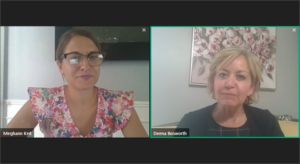 Podcast 83 discusses eventful legislative week
Podcast 83 discusses eventful legislative week County boards can continue to hold public meetings remotely under the Open Meetings Act due to a new order signed by Gov. Gretchen Whitmer Thursday night.
County boards can continue to hold public meetings remotely under the Open Meetings Act due to a new order signed by Gov. Gretchen Whitmer Thursday night.  A law requiring the Legislature to deliver a budget to the governor by July 1 would be set aside for the fiscal 2021 budget under a bill approved by the Senate this week.
A law requiring the Legislature to deliver a budget to the governor by July 1 would be set aside for the fiscal 2021 budget under a bill approved by the Senate this week.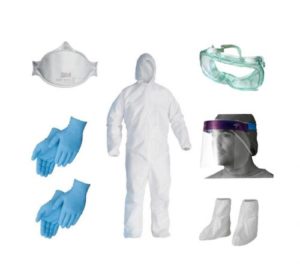 CoPro+, MAC’s cooperative purchasing program especially designed for counties and other public entities, has responded to the COVID-19 pandemic by creating a robust new program to give public entities the best possible prices and services on Personal Protective Equipment.
CoPro+, MAC’s cooperative purchasing program especially designed for counties and other public entities, has responded to the COVID-19 pandemic by creating a robust new program to give public entities the best possible prices and services on Personal Protective Equipment. Who are “shoebox voters”? What are the critical two weeks in any millage election campaign? Due to Proposal 3 of 2018 and the coronavirus pandemic, what percentage of voters are expected to cast ballots by mail in August and November?
Who are “shoebox voters”? What are the critical two weeks in any millage election campaign? Due to Proposal 3 of 2018 and the coronavirus pandemic, what percentage of voters are expected to cast ballots by mail in August and November? New COVID testing requirements for residents of medical care facilities were ordered this week by the
New COVID testing requirements for residents of medical care facilities were ordered this week by the 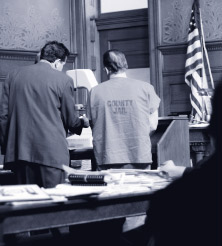 An
An  The Michigan Department of Health and Human Services (MDHHS) is inviting each circuit court that did not apply for the FY20 IV-E Child and Parent Legal Representation (CPLR) Grant to apply for the upcoming fiscal year, 2021. Grant funds will run through Sept. 30, 2021, with an effort to get a start date of those funds as close to Oct. 1, 2020, as possible.
The Michigan Department of Health and Human Services (MDHHS) is inviting each circuit court that did not apply for the FY20 IV-E Child and Parent Legal Representation (CPLR) Grant to apply for the upcoming fiscal year, 2021. Grant funds will run through Sept. 30, 2021, with an effort to get a start date of those funds as close to Oct. 1, 2020, as possible. Counties have concerns with the mechanics of
Counties have concerns with the mechanics of 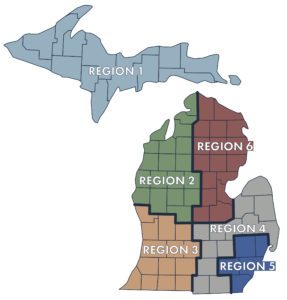 At the 2020 Michigan Counties Annual Conference in August, MAC members will vote on six seats on the
At the 2020 Michigan Counties Annual Conference in August, MAC members will vote on six seats on the  Platforms that would guide MAC’s policy advocacy for the coming year are
Platforms that would guide MAC’s policy advocacy for the coming year are 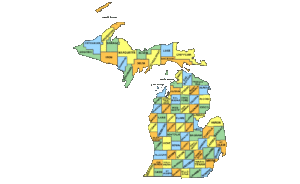 Counties advise on opening status
Counties advise on opening status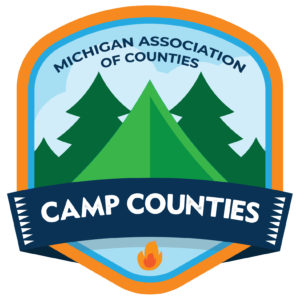 A case study from Benzie County on their work to expand and improve internet service was the focus of the first of five webinars under MAC’s Camp Counties series.
A case study from Benzie County on their work to expand and improve internet service was the focus of the first of five webinars under MAC’s Camp Counties series. A bill to require nursing homes and medical care facilities to allow residents to place a camera in their room advanced out of a Senate committee this week, despite opposition from the Michigan County Medical Care Facilities Council (MCMCFC).
A bill to require nursing homes and medical care facilities to allow residents to place a camera in their room advanced out of a Senate committee this week, despite opposition from the Michigan County Medical Care Facilities Council (MCMCFC).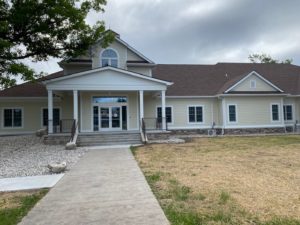 Oscoda moves into new building, 4 years after fire
Oscoda moves into new building, 4 years after fire





